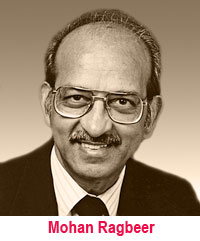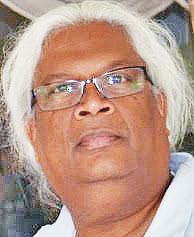Opinions
A Guyanese Farce

(Continued from last issue)
Chief Justice Roxane George gave her ruling on the No Confidence Motion, declaring that it was properly won and thus the Government should resign, and call new elections by March 19th, 90 days after the defeat. President Granger, however, announced he will not resign as the decision has been appealed. At GECOM, a similar air of lassitude reigns, quite unlike preparations for imminent elections. It amazes me that the AFC seems quite happy to eat crow and act like lap-dogs to a domineering partner, overseeing degraded Ministries,
Chief Justice Roxane George gave her ruling on the No Confidence Motion, declaring that it was properly won and thus the Government should resign, and call new elections by March 19th, 90 days after the defeat. President Granger, however, announced he will not resign as the decision has been appealed. At GECOM, a similar air of lassitude reigns, quite unlike preparations for imminent elections. It amazes me that the AFC seems quite happy to eat crow and act like lap-dogs to a domineering partner, overseeing degraded Ministries,
even the Prime Minister’s, whose major duties have been passed over to Minister Harmon, in the President’s Office. I was astonished three years ago when Mr. Nagamootoo accepted this demotion, hardly had the coalition started working. Had he instead, with his colleagues, insisted on preserving their positions and adherence to their partnership agreement, would the PNC (for this is the Party in power) have pulled rank and impose its own way? Perhaps the thought of “rights” took second place to the freedom from PPP wrongdoing, making any sacrifice of privilege bearable.
I am surprised too that Mr. Ramjattan became so content with so little, when even PNC nonentities (ciphers) had more responsibility than he. The man that he became was not the same who spoke to Toronto backers so positively in the pre-election period. I know a few who worked to support the AFC in New York who have regretted their efforts, and might do the opposite this time, even though the prospect of a PPP/C win is quite disheartening. Especially with the figure of Jagdeo directing the Presidency, for I cannot see Irfan Ali being any better than Donald. Ramotar. His choice is a cynical statement to Guyanese about how the PPP views the population, and how ossified the major parties are in their national postures.
To choose Mr. Ali when there are so many clouds over his head (whether innocent or not, as he has yet to show how his legitimate income could expand into his current assets. Surely there are fresh faces, untainted faces – not the PPP-NICIL groups), people of talent and experience who could have been more acceptable.
One despairs for the old country, to have fallen from the avaricious British to a heartless, savage and corrupt PNC under Forbes Burnham then to further corruption under Jagdeo’s PPP/C, who was, after all, a Jagan lieutenant, from back in1993.
AG Williams is buying time for the Party to speed up a few projects to lure voters next elections; he has appealed Justice George’s verdict, and backs house-to-house voter registration, a long process, despite having a valid list compiled for recent local government elections.
The PNC has not changed its direction nor its methods and remains as disgraceful as Dr. David Hinds has painted the PPP/C in a January 28 article (https://guyaneseonline.net/2019/01/28). The evils he ascribes to the PPP were British and introduced to Guyana by Burnham before independence, a period Mr. Hinds should visit or revisit, as appropriate.
When Jagan invited Burnham to join the PPP in January1950, Sidney King (Eusi Kwayana), Ashton Chase and others opposed his Chairmanship. Burnham split the Party in 1955, having targetted Indians in a prior letter to his mother. In his time as PM and President, he expelled Indians from the Civil Service and other Government offices, seized private estates, blocked Indian sources of income, choked, robbed, shot, bombed and expelled them, and made the public road at Buxton impassable; Hinds should read The Indelible Red Stain to get an insight into this.
Jagan had always sought the African vote; he helped pull Afro-Guyanese into populist politics, while Burnham hardly succeeded with Indians, barring legal types or enemies of Jagan: Ramphal, Sasenarine Singh, Kamaluddeen Mohammed and others. The PNC rarely courted Indians; instead we got Volda Lawrence, who sounded like a latter day Burnham.
Long before the Phantom forces, Burnham raised a militia of loyal followers, all black, taught to carry and use arms, and started a compulsory national service that forced Indian girls to bivouac with black boys, to “douglarise” the population! He developed the Rebel Plan X-13, sanctioned the expulsion of Indians from Wismar (Linden), for which the PNC has never apologised, on a date celebrated to this day as Independence Day, a far sadder story than PPP use of Police at Linden. Nearly every complaint Hinds makes has a PNC beginning or counterpart.
Williams’ delays will help the PNC/AFC to win the next elections the same way Burnham won each of his.
I am surprised too that Mr. Ramjattan became so content with so little, when even PNC nonentities (ciphers) had more responsibility than he. The man that he became was not the same who spoke to Toronto backers so positively in the pre-election period. I know a few who worked to support the AFC in New York who have regretted their efforts, and might do the opposite this time, even though the prospect of a PPP/C win is quite disheartening. Especially with the figure of Jagdeo directing the Presidency, for I cannot see Irfan Ali being any better than Donald. Ramotar. His choice is a cynical statement to Guyanese about how the PPP views the population, and how ossified the major parties are in their national postures.
To choose Mr. Ali when there are so many clouds over his head (whether innocent or not, as he has yet to show how his legitimate income could expand into his current assets. Surely there are fresh faces, untainted faces – not the PPP-NICIL groups), people of talent and experience who could have been more acceptable.
One despairs for the old country, to have fallen from the avaricious British to a heartless, savage and corrupt PNC under Forbes Burnham then to further corruption under Jagdeo’s PPP/C, who was, after all, a Jagan lieutenant, from back in1993.
AG Williams is buying time for the Party to speed up a few projects to lure voters next elections; he has appealed Justice George’s verdict, and backs house-to-house voter registration, a long process, despite having a valid list compiled for recent local government elections.
The PNC has not changed its direction nor its methods and remains as disgraceful as Dr. David Hinds has painted the PPP/C in a January 28 article (https://guyaneseonline.net/2019/01/28). The evils he ascribes to the PPP were British and introduced to Guyana by Burnham before independence, a period Mr. Hinds should visit or revisit, as appropriate.
When Jagan invited Burnham to join the PPP in January1950, Sidney King (Eusi Kwayana), Ashton Chase and others opposed his Chairmanship. Burnham split the Party in 1955, having targetted Indians in a prior letter to his mother. In his time as PM and President, he expelled Indians from the Civil Service and other Government offices, seized private estates, blocked Indian sources of income, choked, robbed, shot, bombed and expelled them, and made the public road at Buxton impassable; Hinds should read The Indelible Red Stain to get an insight into this.
Jagan had always sought the African vote; he helped pull Afro-Guyanese into populist politics, while Burnham hardly succeeded with Indians, barring legal types or enemies of Jagan: Ramphal, Sasenarine Singh, Kamaluddeen Mohammed and others. The PNC rarely courted Indians; instead we got Volda Lawrence, who sounded like a latter day Burnham.
Long before the Phantom forces, Burnham raised a militia of loyal followers, all black, taught to carry and use arms, and started a compulsory national service that forced Indian girls to bivouac with black boys, to “douglarise” the population! He developed the Rebel Plan X-13, sanctioned the expulsion of Indians from Wismar (Linden), for which the PNC has never apologised, on a date celebrated to this day as Independence Day, a far sadder story than PPP use of Police at Linden. Nearly every complaint Hinds makes has a PNC beginning or counterpart.
Williams’ delays will help the PNC/AFC to win the next elections the same way Burnham won each of his.
Brave neighbour an eater
of hot peppers
 Romeo Kaseram
Romeo Kaseram
One of my early lessons in bravery and admiration came as a learned experience through observation of a neighbour when I was growing up back home, watching him eat hot peppers as an accompaniment to his food.
This neighbour loved sea food; so much that he owned a fishing boat, and what seemed to be miles and miles of nets, which he hung out to dry like an unending green fence around the perimeter of his house. Net-mending was a hobby he took seriously when his workday was done, spending the evenings sewing up the breaks with a special mending needle late
into the evening by the light of a ‘flambeau’ – a green beer bottle with its thick wick of rolled cloth that burned kerosene with a sooty, choking, orange flame. He loaded the net unto an oxen-drawn cart, most times on a Saturday morning, and strode off to the ocean, which was about an hour’s walk away.
I would watch him head out, with two, three, or four of his seven sons sitting on the top of the net and dangling their long legs over the side, the oxen unhurried despite being impatiently urged along with the tip of a broken branch that still held a few of its leaves. He left his wife and daughters behind; the former already at work picking and preparing the seasonings for concocting the heady curry he liked for his sea-food; meanwhile, his daughters swept the yard, singing popular songs from Bollywood movies in a chorus of high-pitched, inviting voices.
The neighbour returned at the end of the day, still wielding the branch but minus the leaves, urging the tired oxen on with “Hi! Hi!” as they heaved the cart weighted down with the net soaking wet, leaving a trail of sea water on the dry roadway. Two, three, or all four of the exhausted boys would be sound asleep on the damp net that smelled richly of the sea.
A dented, rusted barrel, tied with rope to one of the four corner-posts on the cart contained the bounty of the ocean, his catch-of-the-day in thousands of shrimp, and hundreds of silver sardines already greying in the sun. There were also large bright yellow, red, and grey fish, some flat, others wide, and a few lengthy with serrated teeth, lumped together in a growing stench of sea-water, a few clinging to the memory of the ocean and thrashing weakly alongside the freshly dead.
I had no idea then of how visceral fear could become when it is rooted deep in the belly, such as one feels when confronted by the imponderable weight of the sea, so I did not appreciate what dangers this neighbour encountered when he ventured out with his oxen-cart drowning with the dead-weight of a sea-dampened net. Neither did I know he was preparing his sons to face a harsh world by exposing them to the hazards of an ocean, which could in a moment become an unforgiving antagonist, ruthlessly taking away as it did, another neighbour’s two sons years later after I had grown into a young man.
For now, as a sheltered boy growing up under a watchful mother, and the all-seeing and all-knowing wisdom of a grandmother who had seen it all as a young girl married in her childhood years even before she had grown into a teenager, an act of bravery for me was not in the dangers the neighbour faced when he challenged the turbulent, tossing sea, casting his net into the water to harvest its bounty, even as the antagonistic ocean threatened with each surge to reach up and grasp a son, or two, or three, or four to drag overboard and into the deep.
It was not in my neighbour aexpertly handling a cornered crab that charged with a back-and-forth momentum, its pinchers raised and snapping like pairs of scissors, distracting its levering eyes with one hand while the other hand crept up in its blind spot for the fatal, lifting grasp behind its back.
It was not in the precision of hand-and-eye coordination when he gutted, and then sliced each large fish in a thrashing tumult of its slaughter, his focus on the silver edge of the blade, ignoring its pleading, lidless wide-eyes, even as red blood mixed with the scum of sea-water, running down the killing table to pool under his long, crab-like toes.
In my lack of exposure to the wider, cruel world, these events offered no insight for admiration and appreciation of my neighbour’s bravery. However, what intrigued me was the singularity of his unyielding eyes to the peppers he consumed with his food; it was a steadfastness and unwavering courage worthy of emulation as he took bite after bite from the fires of hell trapped in red, yellow, and orange scotch bonnet peppers.
I tried it once; just once, when my mother and Ma were distracted, biting into a purloined pepper, my mouth bursting into flames, even as my wonderment at this neighbour’s stamina rocketed his courage into the upper realms of esteem and eminence.
I would watch him head out, with two, three, or four of his seven sons sitting on the top of the net and dangling their long legs over the side, the oxen unhurried despite being impatiently urged along with the tip of a broken branch that still held a few of its leaves. He left his wife and daughters behind; the former already at work picking and preparing the seasonings for concocting the heady curry he liked for his sea-food; meanwhile, his daughters swept the yard, singing popular songs from Bollywood movies in a chorus of high-pitched, inviting voices.
The neighbour returned at the end of the day, still wielding the branch but minus the leaves, urging the tired oxen on with “Hi! Hi!” as they heaved the cart weighted down with the net soaking wet, leaving a trail of sea water on the dry roadway. Two, three, or all four of the exhausted boys would be sound asleep on the damp net that smelled richly of the sea.
A dented, rusted barrel, tied with rope to one of the four corner-posts on the cart contained the bounty of the ocean, his catch-of-the-day in thousands of shrimp, and hundreds of silver sardines already greying in the sun. There were also large bright yellow, red, and grey fish, some flat, others wide, and a few lengthy with serrated teeth, lumped together in a growing stench of sea-water, a few clinging to the memory of the ocean and thrashing weakly alongside the freshly dead.
I had no idea then of how visceral fear could become when it is rooted deep in the belly, such as one feels when confronted by the imponderable weight of the sea, so I did not appreciate what dangers this neighbour encountered when he ventured out with his oxen-cart drowning with the dead-weight of a sea-dampened net. Neither did I know he was preparing his sons to face a harsh world by exposing them to the hazards of an ocean, which could in a moment become an unforgiving antagonist, ruthlessly taking away as it did, another neighbour’s two sons years later after I had grown into a young man.
For now, as a sheltered boy growing up under a watchful mother, and the all-seeing and all-knowing wisdom of a grandmother who had seen it all as a young girl married in her childhood years even before she had grown into a teenager, an act of bravery for me was not in the dangers the neighbour faced when he challenged the turbulent, tossing sea, casting his net into the water to harvest its bounty, even as the antagonistic ocean threatened with each surge to reach up and grasp a son, or two, or three, or four to drag overboard and into the deep.
It was not in my neighbour aexpertly handling a cornered crab that charged with a back-and-forth momentum, its pinchers raised and snapping like pairs of scissors, distracting its levering eyes with one hand while the other hand crept up in its blind spot for the fatal, lifting grasp behind its back.
It was not in the precision of hand-and-eye coordination when he gutted, and then sliced each large fish in a thrashing tumult of its slaughter, his focus on the silver edge of the blade, ignoring its pleading, lidless wide-eyes, even as red blood mixed with the scum of sea-water, running down the killing table to pool under his long, crab-like toes.
In my lack of exposure to the wider, cruel world, these events offered no insight for admiration and appreciation of my neighbour’s bravery. However, what intrigued me was the singularity of his unyielding eyes to the peppers he consumed with his food; it was a steadfastness and unwavering courage worthy of emulation as he took bite after bite from the fires of hell trapped in red, yellow, and orange scotch bonnet peppers.
I tried it once; just once, when my mother and Ma were distracted, biting into a purloined pepper, my mouth bursting into flames, even as my wonderment at this neighbour’s stamina rocketed his courage into the upper realms of esteem and eminence.
